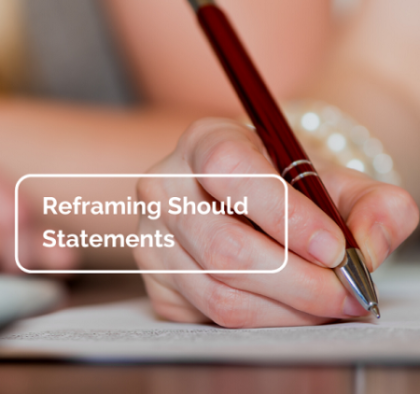Reframing Should Statements
“Should”. It seems like such an innocuous word, right? Well, you might be surprised to learn that it could actually be causing you harm.
We all know that spoken and written words have power, and so do the words we think. The words in your thoughts directly affect how you feel, which in turn affects your actions and the subsequent outcome.
“Words cannot only create emotions, but they also create actions. And from our actions flow the results of our lives.” ~ Tony Robbins
There is one very common word that causes problems for almost everyone. Should.
What is Wrong with ‘Should’?
Consider the context that ‘should’ is often used in. It is usually expressing unreasonable or unfulfilled standards that we have imposed upon ourselves or others. The Oxford Dictionary notes that “should” is used “typically when criticizing someone’s actions.”
You might assume that reprimanding yourself with “I should be more organised”, or “I should be more successful at work” will motivate and inspire you to change for the better–but it won’t. In fact, ‘shoulding’ typically has the opposite effect.
‘Shoulding’ on Yourself
When you use “should” against yourself, you are subtly telling yourself that you’re doing something wrong. You instantly feel like a failure for not meeting your own expectations. Doing this habitually is damaging to your moods, self-esteem, and will chip away at your motivation.
When you continually judge your reality against an imagined standard that you haven’t achieved, you inevitably feel less capable of achieving whatever it is you were aiming for in the first place. Should statements perpetuate negative thought patterns that make you feel as if you have failed. Causing feelings of guilt, shame, regret, frustration, discouragement, hopelessness, and so on.
‘Shoulding’ on Others
Using should statements against other people is also damaging – for them as well as for you. When applied to other people—i.e., when others don’t live up to your “should” or “shouldn’t” expectations— you are saying that they have failed to meet a reasonable expectation, resulting in feelings of hurt, resentment, and frustration for all parties.
Think about this scenario: a client fails to complete a piece of work within a timescale you had mutually agreed upon. If you say, “what do you think you could have done better?”, it opens up a dialogue with potential for future growth, free from feelings of blame and guilt. If you instead say, “you should have done better”, you instantly shut down that opportunity for growth and most likely demoralised the person you are talking to!
Shoulding against others is often used in an accusatory way; the other person has not fulfilled what you expected of them. It leads to feeling disappointed, frustrated, or stuck with no forward momentum.
Reframing the Shoulds
It can be difficult to break away from using these types of statements or thought patterns. They may have become so automatic that you barely notice you are doing it. Be mindful of the words you say out loud or that you think to yourself. You may discover that you are using should statements more frequently than you anticipated. Fortunately, you can do something about it.
Reframe the statements
The first thing to note with ‘should’ is that it is avoiding reality. When you caveat a statement with should, you are focussing on your expectation and not your reality.
The first step to reframing should statements is to accept your reality, even if you are not happy with it. For example, instead of “I should earn more money”, what about “I’m not happy with how much I earn right now”, which is accepting the reality of your situation and the first step toward a plan of resolution.
Another example is to imagine you have slept in late. You might find yourself thinking “I should wake up earlier.” Well, you didn’t, but now you also feel like you’ve failed before you’ve even started your day! You examine the feeling behind it and realise what you really want is to be productive. By unpacking this, you can reframe the thought as “I can still get lots achieved today, even though I overslept.” The outcome is that you can still make the most of your day, and you haven’t put yourself in the position of having failed right from the start.
When you catch yourself using these statements, write them down. Examine what the statement is really saying about your thoughts and feelings about the situation. Consider why you are putting pressure on yourself with the statement.
Once you have a better understanding of it, you can then reframe and reword it so that you can change the “should” thoughts with others that are more beneficial. For example, Instead of using should use “could” or “would like to”
And finally…
Don’t be too hard on yourself if you continue to think about and use these types of statements for a while, it takes practice to break long-held habits. Rather than using negative language, do your best to not allow should statements or other negative thinking to dictate your life. Try reframing your language and thoughts for a few days and see how it feels to be free from all those shoulds.
Get in Touch to find out how working on your mindset and personal development can help you reach your full potential.



